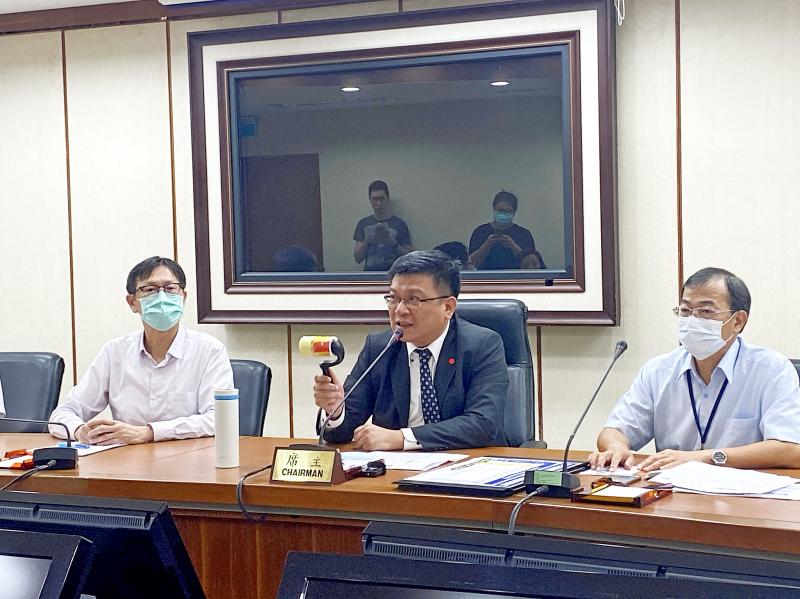Deputy Minister of Economic Affairs Tseng Wen-sheng (曾文生) yesterday condemned the Taichung City Government for sanctioning Taiwan Power Co (Taipower, 台電) for restarting the No. 2 generator at the Taichung Power Plant.
Voicing the ministry’s support for the state-run utility, Tseng accused local authorities of political maneuvering.
“The Taichung City Government has been on Taipower’s case since last year... They are only setting up more and more obstacles to prevent Taipower from ensuring a steady energy supply for the nation,” Tseng told a news conference in Taipei.

Photo: Huang Pei-chun, Taipei Times
After imposing multiple fines on Taipower due to excessive coal use, the city government last year revoked two of the company’s operating licenses for the No. 2 and No. 3 generators at the plant, a move that was later countermanded by the Environmental Protection Administration (EPA).
The city government last week fined Taipower NT$2 million (US$67,431) for restarting the No. 2 generator, followed by a heavier NT$20 million fine on Monday, while the Taichung Environmental Protection Bureau yesterday threatened to take legal action against Taipower chairman Yang Wei-fuu (楊偉甫).
“The operation of Taipower’s No. 2 generator is completely legal in the eyes of the law [following the EPA’s ruling]... Furthermore, the No. 2 generator and No. 3 generator are the least-polluting generators at the Taichung Power Plant due to recent improvements,” Tseng said.
The city government’s actions are far from helpful in the reduction of air pollution in central Taiwan, he added.
Asked whether Taipower would be willing to negotiate the shutdown of other generators instead, Tseng gave a firm “no.”
“The point is flexibility, we need [to be able to operate] all 10 generators to guarantee this kind of flexibility,” Tseng said, adding that Taipower has promised to simultaneously run a maximum of nine generators during summer.
“While we can only have eight to nine generators working at the same time, we must have [enough] leg room to maintain a 10 percent power reserve,” Taipower vice president and spokesman Hsu Tsao-hua (徐造華) said, adding that the increasing energy consumption in Taichung should also be taken into consideration.
“Taichung has consumed an average of 31,500 gigawatt-hours last year, higher than the Taichung Power Plant’s annual output of 30,000 gigawatt-hours,” Hsu said.

In Italy’s storied gold-making hubs, jewelers are reworking their designs to trim gold content as they race to blunt the effect of record prices and appeal to shoppers watching their budgets. Gold prices hit a record high on Thursday, surging near US$5,600 an ounce, more than double a year ago as geopolitical concerns and jitters over trade pushed investors toward the safe-haven asset. The rally is putting undue pressure on small artisans as they face mounting demands from customers, including international brands, to produce cheaper items, from signature pieces to wedding rings, according to interviews with four independent jewelers in Italy’s main

Japanese Prime Minister Sanae Takaichi has talked up the benefits of a weaker yen in a campaign speech, adopting a tone at odds with her finance ministry, which has refused to rule out any options to counter excessive foreign exchange volatility. Takaichi later softened her stance, saying she did not have a preference for the yen’s direction. “People say the weak yen is bad right now, but for export industries, it’s a major opportunity,” Takaichi said on Saturday at a rally for Liberal Democratic Party candidate Daishiro Yamagiwa in Kanagawa Prefecture ahead of a snap election on Sunday. “Whether it’s selling food or

CONCERNS: Tech companies investing in AI businesses that purchase their products have raised questions among investors that they are artificially propping up demand Nvidia Corp chief executive officer Jensen Huang (黃仁勳) on Saturday said that the company would be participating in OpenAI’s latest funding round, describing it as potentially “the largest investment we’ve ever made.” “We will invest a great deal of money,” Huang told reporters while visiting Taipei. “I believe in OpenAI. The work that they do is incredible. They’re one of the most consequential companies of our time.” Huang did not say exactly how much Nvidia might contribute, but described the investment as “huge.” “Let Sam announce how much he’s going to raise — it’s for him to decide,” Huang said, referring to OpenAI

The global server market is expected to grow 12.8 percent annually this year, with artificial intelligence (AI) servers projected to account for 16.5 percent, driven by continued investment in AI infrastructure by major cloud service providers (CSPs), market researcher TrendForce Corp (集邦科技) said yesterday. Global AI server shipments this year are expected to increase 28 percent year-on-year to more than 2.7 million units, driven by sustained demand from CSPs and government sovereign cloud projects, TrendForce analyst Frank Kung (龔明德) told the Taipei Times. Demand for GPU-based AI servers, including Nvidia Corp’s GB and Vera Rubin rack systems, is expected to remain high,